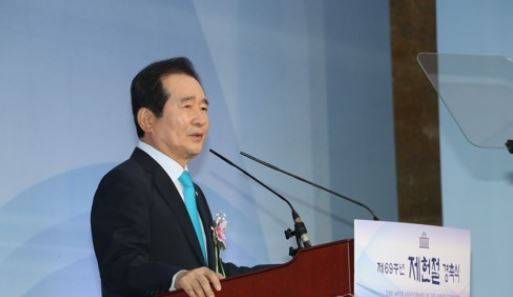Parliamentary speaker hopes for consensus over constitutional revision by year-end
By Catherine ChungPublished : July 17, 2017 - 11:47
National Assembly Speaker Chung Sye-kyun voiced hopes Monday that ruling and opposition parties can come up with a joint proposal for a constitutional revision by the end of the year and submit it early next year.
During his speech marking the 69th Constitution Day, Chung also said that the amendment of the decades-old basic law must be carried out "for the benefit of the country's citizens and its future" in an open, transparent way.

Chung has been a vocal advocate of the revision of the Constitution, which he said has failed to embrace social and political changes that have transpired since its last change was made in 1987 to largely prevent authoritarian rulers from prolonging their presidencies.
"Each party's presidential candidate has pledged a revision (during the election campaign), and President Moon Jae-in also said he wants to hold a referendum on it in time for the local elections next June," he said.
"Thus, the revision is not something up for consideration, but it is people's demand and political circles' obligation," he added.
The speaker said that he currently seeks to submit to the assembly the parties' joint proposal for the revision in March, set up a parliamentary vote on it in May and hold a referendum the following month when the nation is set to hold the gubernatorial and mayoral elections.
Chung, in addition, said that the parliament that represents the citizens must lead the revision efforts. He also pointed out that discussions on the revision focus on enhancing regional autonomy and addressing the current concentration of powers in a single national leader, which has long been blamed for corruption and intense political polarization.
Tabling the proposal for a constitutional revision requires backing from a majority of the 299 lawmakers. The final passage of the bill needs support from two-thirds of the total legislators.

Later, former statesmen held a debate on the revision issue at the legislature, converging on the need for the diffusion of state powers concentrated in the president.
"Politicians have been repetitively in a combative mode to grab presidential power... This is because of the imperial-like presidential system," Kim One-ki, a former parliamentary speaker, said.
"There has been widespread public perception of the need for breaking the fundamental framework of the Constitution (that allows for the current presidential system)," he added.
Kim Hyong-o, another former parliamentary chief, argued that a revision must include a clause specifying the responsibilities of lawmakers to help shore up public trust in the legislature long criticized for seemingly perennial partisan conflicts.
"It is difficult to strengthen the authority of the legislature when there is strong public distrust," he said.
Park Kwan-yong, another former assembly speaker, called for a revision to institute a bicameral parliamentary system, casting the current unicameral one as "dangerous," while former Prime Minister Lee Hong-koo stressed the importance of decentralization. (Yonhap)


![[Exclusive] Korean military set to ban iPhones over 'security' concerns](http://res.heraldm.com/phpwas/restmb_idxmake.php?idx=644&simg=/content/image/2024/04/23/20240423050599_0.jpg&u=20240423183955)




![[Herald Interview] 'Amid aging population, Korea to invite more young professionals from overseas'](http://res.heraldm.com/phpwas/restmb_idxmake.php?idx=644&simg=/content/image/2024/04/24/20240424050844_0.jpg&u=20240424200058)
![[Pressure points] Leggings in public: Fashion statement or social faux pas?](http://res.heraldm.com/phpwas/restmb_idxmake.php?idx=644&simg=/content/image/2024/04/23/20240423050669_0.jpg&u=)









